As the House select committee investigating the Jan. 6 riot at the U.S. Capitol ramps up its investigation into the events of that day, most Americans continue to say it is important to find and prosecute those who broke into and rioted at the Capitol.
However, since March, there has been a decline in the share of the public saying it is important that those who broke into the Capitol be prosecuted (from 87% to 78%), with the change coming almost entirely among Republicans and Republican-leaning independents.
Since March, there has been a 22 percentage point drop in the share of Republicans who think it is very or somewhat important that federal law enforcement agencies find and prosecute those who broke into and rioted at the U.S. Capitol on Jan. 6 (from 79% to 57%).
Moreover, only about quarter of Republicans (27%) view the prosecution of the rioters as very important; six months ago, half said this was very important. Among Democrats and Democratic leaners, there have been only modest changes in opinions about finding and prosecuting the Jan. 6 rioters. Today, 95% say it is important, including 80% who see this as very important.
The new survey by Pew Research Center, conducted Sept. 13-19 among 10,371 adults on the Center’s nationally representative American Trends Panel, finds partisan divides on a range of issues related to the events of Jan. 6, including views of the severity of the penalties for the those who broke into the Capitol, the amount of attention the riot has received and confidence in the fairness of the investigation by the House select committee.
Partisan differences over the Jan. 6 assault on the Capitol have been evident since shortly after it occurred, including in initial open-ended reactions of Republicans and Democrats to the riot.
Among the public overall, 48% say that the criminal penalties those who broke into the U.S. Capitol have been receiving are not severe enough, while two-in-ten say they are too severe and 29% say the penalties are about right. Democrats are far more likely than Republicans to say that the penalties are not severe enough.
An overwhelming majority of Democrats (71%) say the criminal penalties are not severe enough, while 21% say they are about right. Just 6% say the penalties are too severe.
Republicans are more divided in their assessment of the criminal penalties. About four-in-ten Republicans and Republican leaners (38%) say that the penalties for those who broke into the Capitol are too severe. A nearly equal share (39%) say the penalties are about right. Only 19% of Republicans say that the criminal penalties are not severe enough.
There are also ideological divides among Republicans: 44% of conservative Republicans say that the penalties for those who broke into the Capitol are too severe, while 28% of moderate and liberal Republicans say the same. Moderate and liberal Republicans are twice as likely as conservative Republicans to say that the penalties are not severe enough (28% vs. 14%). There are no significant ideological divides among Democrats.
Since March, the share of the public that says there has been too little attention paid to the January riot at the Capitol has risen by 8 percentage points (35% now, 27% then), while there has been a comparable decline in the share saying it is receiving the right amount of attention. Nearly three-in-ten (29%) say there has been too much attention to the riot and its impacts, little changed from six months ago.
Democrats account for much of this change. The share of Democrats saying there has been too little attention paid to the Jan. 6 riot and its impacts has increased 14 points since March (from 40% to 54%).
A 57% majority of Republicans say that there has been too much attention paid to the Jan. 6 riot, roughly on par with March. In the current survey, 65% of conservative Republicans say the riot and its impacts have gotten too much attention, compared with 41% of moderate and liberal Republicans.
Liberal Democrats are somewhat more likely than conservative and moderate Democrats to say that there has been too little attention to the Jan. 6 riot and its impacts (60% vs. 49%).
Sizable partisan split in confidence that House committee will be fair and reasonable in investigating Jan. 6 riot
As a House select committee seeks information from Trump officials about the events of Jan. 6, about two-thirds of adults say they have heard either a lot (11%) or a little (57%) about this committee and the investigation; 31% of Americans say they have heard nothing at all. Republicans are slightly more likely than Democrats to say they haven’t heard anything about the committee (35% vs. 27%).
When asked how confident they are that the committee’s investigation will be fair and reasonable, just 11% of Americans say they are very confident and another 34% say they are somewhat confident. A 54% majority say they are either not too (32%) or not at all confident (22%) that the investigation will be fair and reasonable.
There are wide partisan divides over confidence in the committee, with Republicans much less likely than Democrats to say they think the investigation will be fair and reasonable.
About four-in-ten Republicans (37%) say they are not too confident that the committee’s investigation will be fair, while an additional 40% are not confident in the committee at all. Just 3% are very confident in the committee to be fair and reasonable.
Fully 63% Democrats say they are at least somewhat confident that the investigation will be fair and reasonable, while 36% express little or no confidence.
Among Republicans, a wide majority of conservatives (83%) say that they aren’t confident that the investigation will be fair, including nearly half (47%) who say they are not at all confident. Moderate and liberal Republicans are somewhat less negative, although two-thirds lack confidence in the fairness of the investigation, with 26% saying they are not at all confident. There are no significant ideological differences on this question among Democrats.
Among Republicans, there also are stark differences in opinions about the Jan. 6 riot and its aftermath between those who think Trump was the rightful winner of the presidential election and those who think Joe Biden won legitimately.
In June, about two-thirds (65%) of Republicans and Republican leaners said that Trump definitely (33%) or probably (33%) won the 2020 presidential election, meaning they believe he received the most votes cast by eligible voters in enough states to win. Official counts show that Biden received the most votes cast by eligible voters in enough states to win.
Republicans who said Biden definitely or probably won the 2020 presidential election (43%) are more than twice as likely as Republicans who said Trump won (18%) to say that it is very important that federal law enforcement agencies find and prosecute the individuals who broke into and rioted at the U.S. capitol on Jan. 6.
Similarly, about four-in-ten Republicans who said Biden won (39%) say they are at least somewhat confident that the House select committee’s investigation into Jan. 6 will be fair and reasonable. Only 13% of Republicans who said Trump won say the same.
Republicans who said Trump won are more likely to say the criminal penalties for those who broke into the Capitol and rioted have been receiving are too severe. About half of Republicans who said Trump won (48%) express this view, compared with 19% of Republicans who said Biden won.


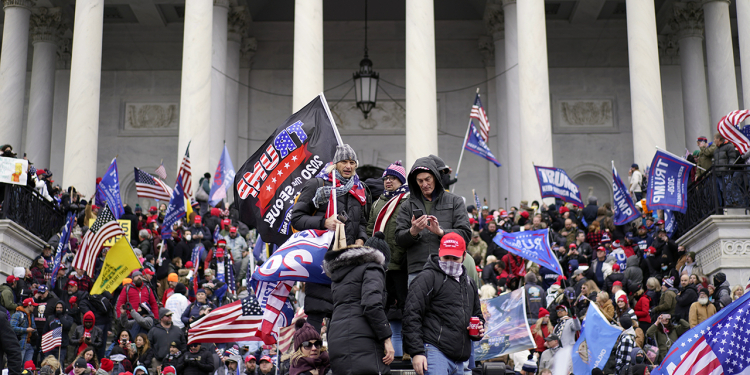
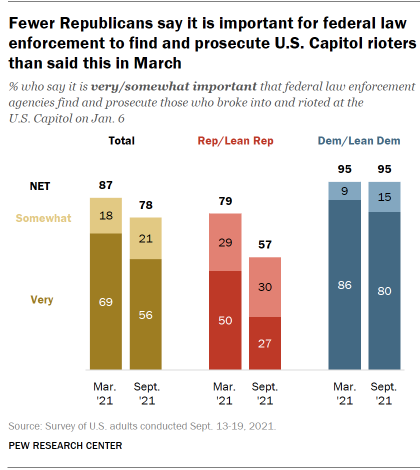
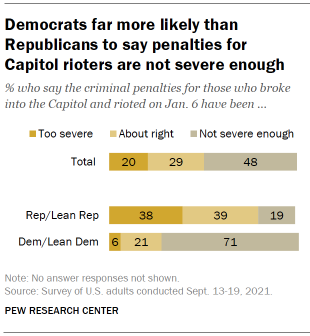
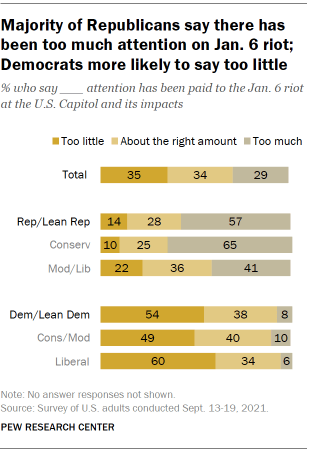
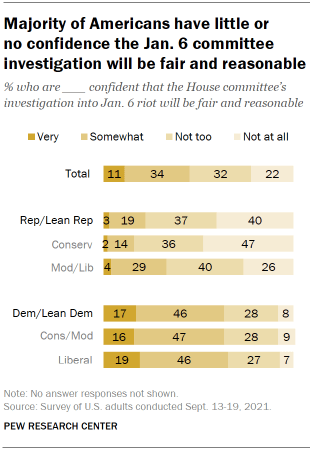
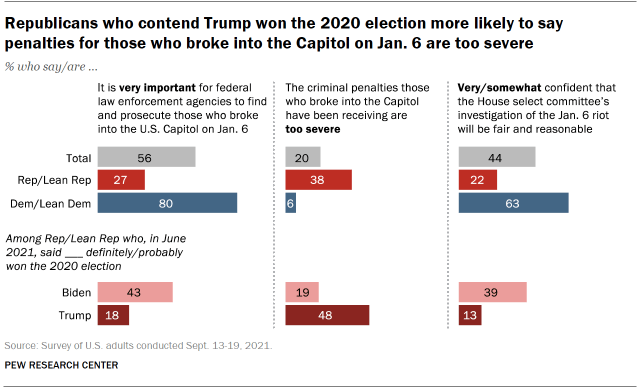




























Discussion about this post